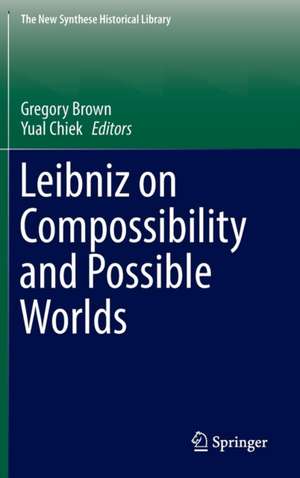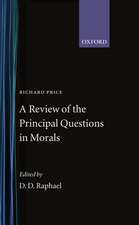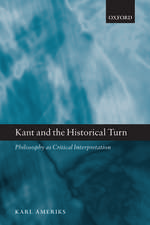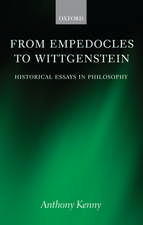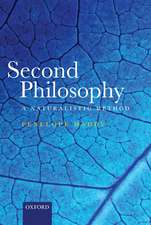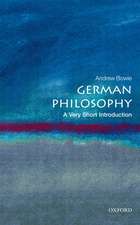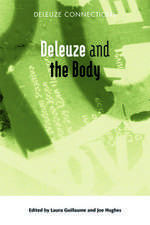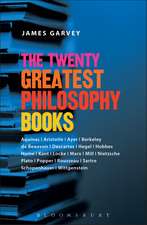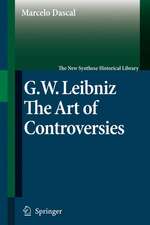Leibniz on Compossibility and Possible Worlds: The New Synthese Historical Library, cartea 75
Editat de Gregory Brown, Yual Chieken Limba Engleză Hardback – 4 ian 2017
Given the fact, however, that none ofthe approaches to understanding Leibniz’s notions of compossibility and possible words suggested to date have gained universal acceptance, the goal of this book is to gather a body of new papers that explore ways of either refining previous interpretations in light of the objections that have been raised against them, or ways of framing new interpretations that will contribute to a fresh understanding of these key notions in Leibniz’s thought.
| Toate formatele și edițiile | Preț | Express |
|---|---|---|
| Paperback (1) | 695.53 lei 6-8 săpt. | |
| Springer International Publishing – 12 iul 2018 | 695.53 lei 6-8 săpt. | |
| Hardback (1) | 701.72 lei 6-8 săpt. | |
| Springer International Publishing – 4 ian 2017 | 701.72 lei 6-8 săpt. |
Din seria The New Synthese Historical Library
- 18%
 Preț: 950.52 lei
Preț: 950.52 lei - 18%
 Preț: 949.73 lei
Preț: 949.73 lei - 18%
 Preț: 946.24 lei
Preț: 946.24 lei - 18%
 Preț: 953.82 lei
Preț: 953.82 lei - 20%
 Preț: 1618.07 lei
Preț: 1618.07 lei - 15%
 Preț: 643.00 lei
Preț: 643.00 lei - 18%
 Preț: 955.56 lei
Preț: 955.56 lei - 15%
 Preț: 644.82 lei
Preț: 644.82 lei - 18%
 Preț: 1387.55 lei
Preț: 1387.55 lei - 18%
 Preț: 955.56 lei
Preț: 955.56 lei - 18%
 Preț: 951.47 lei
Preț: 951.47 lei - 15%
 Preț: 637.46 lei
Preț: 637.46 lei - 15%
 Preț: 644.63 lei
Preț: 644.63 lei - 18%
 Preț: 947.32 lei
Preț: 947.32 lei - 15%
 Preț: 644.49 lei
Preț: 644.49 lei - 15%
 Preț: 645.47 lei
Preț: 645.47 lei - 18%
 Preț: 953.82 lei
Preț: 953.82 lei - 18%
 Preț: 958.38 lei
Preț: 958.38 lei - 15%
 Preț: 639.25 lei
Preț: 639.25 lei - 15%
 Preț: 638.89 lei
Preț: 638.89 lei - 18%
 Preț: 953.65 lei
Preț: 953.65 lei - 18%
 Preț: 952.26 lei
Preț: 952.26 lei - 18%
 Preț: 950.52 lei
Preț: 950.52 lei - 18%
 Preț: 1225.28 lei
Preț: 1225.28 lei - 15%
 Preț: 646.11 lei
Preț: 646.11 lei
Preț: 701.72 lei
Preț vechi: 825.55 lei
-15% Nou
Puncte Express: 1053
Preț estimativ în valută:
134.29€ • 139.68$ • 110.86£
134.29€ • 139.68$ • 110.86£
Carte tipărită la comandă
Livrare economică 14-28 aprilie
Preluare comenzi: 021 569.72.76
Specificații
ISBN-13: 9783319426938
ISBN-10: 3319426931
Pagini: 254
Ilustrații: IX, 256 p. 1 illus.
Dimensiuni: 155 x 235 x 16 mm
Greutate: 0.55 kg
Ediția:1st ed. 2016
Editura: Springer International Publishing
Colecția Springer
Seria The New Synthese Historical Library
Locul publicării:Cham, Switzerland
ISBN-10: 3319426931
Pagini: 254
Ilustrații: IX, 256 p. 1 illus.
Dimensiuni: 155 x 235 x 16 mm
Greutate: 0.55 kg
Ediția:1st ed. 2016
Editura: Springer International Publishing
Colecția Springer
Seria The New Synthese Historical Library
Locul publicării:Cham, Switzerland
Cuprins
Chapter 1. “Compossibility: An Overview”; Yual Chiek.- Chapter 2. “Compossibility and the Unity of the Divine Will”; Thomas Feeney.- Chapter 3. “Compossibility: A Defense of the Cosmological Interpretation”; Donald Rutherford.- Chapter 4. “Leibnizian Possible Worlds and the (Metaphysical) Possibility of Spatial Vacua”; Gregory Brown.- Chapter 5. “In the Same World”; Olli Koistinen.- Chapter 6. “The Fate of ‘The World’ After Leibniz”; James Messina.- Chapter 7. “Harmony and Compossibility in Leibniz”; Brandon Look.- Chapter 8. “On Tiles, Laws, and Worlds – Leibniz and the Problem of Compossibility”; Sebastian Bender.- Chapter 9. “Incompossibility”; Nicholas Rescher.- Chapter 10. “Different Times, Different Worlds: Incompossibility and Incompatibility in Leibniz”; Mogens Laerke.- Chapter 11. “Incompossibility, Individuality, and Relations”; Ohad Nachtomy.- Chapter 12. "Truth, Concepts, and Essences: An Ontological Interpretation of Leibniz's Account of Compossibility"; Joshua Horn.- Chapter 13. "The Independence of Substances and Compossibility"; Kristin Primus.
Recenzii
“This collection brings together nine essays addressing the problem of compossibility in Leibniz’s system of thought. … The collection opens with an excellent introduction to the terrain, reviews established approaches to the problem, and will be extremely helpful to both those new to, and those familiar with, Leibniz. … This collection is an essential read for anyone interested in Leibniz’s metaphysics of possible worlds and compossibility.” (Jacob Mills, Journal of the History of Philosophy, Vol. 55 (4), October, 2017)
Notă biografică
Yual Chiek is a PhD candidate at Queen's University, Kingston ON. He has presented his work at the Leibniz Society of North America, Yale University, Dartmouth College, and the Leibniz Universitat Hannover. He was a Visiting Research Assistant at Yale University, 2011-2013. His research interest include Early-Modern Philosophy, and Contemporary Epistemology and Metaphysics.
Gregory Brown is professor of Philosophy at The University of Houston, Texas. Brown has published numerous articles in the History of Philosophy and in the Philosophy of Leibniz. His papers have appeared in journals such as The Leibniz Society Review, The Journal of the History of Philosophy, and The British Journal for the History of Philosophy. His research interests are The History of Early-Modern Philosophy, and the History and Philosophy of Science.
Textul de pe ultima copertă
This volume brings together a number of original articles by leading Leibniz scholars to address the meaning and significance of Leibniz’s notions of compossibility and possible worlds. In order to avoid the conclusion that everything that exists is necessary, or that all possibles are actual, as Spinoza held, Leibniz argued that not all possible substances are compossible, that is, capable of coexisting. In Leibniz’s view, the compossibility relation divides all possible substances into disjoint sets, each of which constitutes a possible world, or a way that God might have created things. For Leibniz, then, it is the compossibility relation that individuates possible worlds; and possible worlds form the objects of God’s choice, from among which he chooses the best for creation. Thus the notions of compossibility and possible worlds are of major significance for Leibniz’s metaphysics, his theodicy, and, ultimately, for his ethics.
Given the fact, however, that none of the approaches to understanding Leibniz’s notions of compossibility and possible words suggested to date have gained universal acceptance, the goal of this book is to gather a body of new papers that explore ways of either refining previous interpretations in light of the objections that have been raised against them, or ways of framing new interpretations that will contribute to a fresh understanding of these key notions in Leibniz’s thought.
Caracteristici
Presents cutting-edge research on the topic of Leibniz studies A unique book, the first to be exclusively devoted to this topic Posits two of Leibniz’s best-known claims and scrutinizes them from a variety of perspectives
